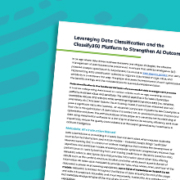In the modern age, the average person is said to generate 1.7 megabytes of ‘data’ per second allowing for the concept of ‘data’ to become a scalable commodity while, at the same time, very fragile.
Navigating the huge realm of cloud data management can sometimes feel like flying through the skies – expansive, occasionally bumpy, but full of potential for those who dare to embark on the journey.
For many companies and organizations, managing legacy data—information stored in outdated systems or formats—poses a significant challenge that can not be overlooked. Effectively managing your legacy data is crucial in maintaining business continuity, ensuring regulatory compliance, and unlocking valuable insights for strategic decision-making
Data governance plays a crucial role in modern enterprises. By managing the availability, usability, integrity, and security of data, it ensures high data quality throughout the data lifecycle. Effective data governance empowers organizations with a comprehensive view of their data, enabling better decision-making, regulatory compliance, and robust data security.
Building a robust data governance program is key to an organization’s successful management and utilization of its data assets. A data governance program fosters data accuracy, security, and regulatory compliance, thus driving more informed decision-making processes.
This paper discusses the importance of implementing a data classification solution in conjunction with AI, the benefits it brings, and the considerations for successful implementation
In today’s data-driven world, the push for data classification is more vital than ever. With the exponential growth of digital data and increasing threats from cybercriminals, efficiently categorizing and protecting sensitive data has become a top priority for businesses. Data classification not only provides a clear roadmap for data security measures but also optimizes data usage, making it a key player in business strategy.
In the world of data governance, staying ahead of the game is critical. As AI and machine learning become more mainstream in the business world, policies and practices need to evolve to protect organizations from potential risks.
With data generation constantly increasing across the business and social worlds, artificial intelligence (AI) and machine learning (ML) are working to enhance our everyday tasks, both personal and professional, one step at a time. There are a number of themes emerging within the world that CIOs should consider for future planning:
Do you save every email, just in case you need something from it one day? Your inbox is essentially a large lake of water and you just need to get to those buried sunglasses, GoPro, and diamond ring you dropped over the years. Data lakes form when massive amounts of data come in and are stored until you have enough data, that you find what you are looking for. Some may think this is a useful security measure, but that’s not always true.














